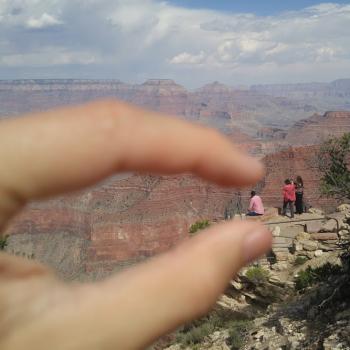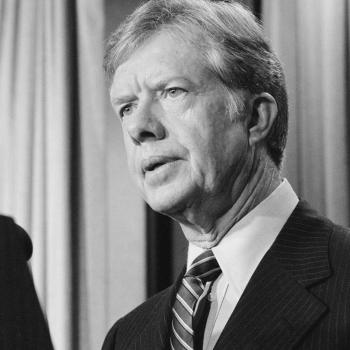I’ve been trying of late to incorporate more diverse assignments and methods of instruction in my teaching. Each semester now in my World Civilizations course, I ask students to write a short paper on what I call the “silence exercise.” As odd as it may seem, merely maintaining silence for a while can be a way of inhabiting strange worlds of the past. And it seems like a fitting way to conclude the course as we assess the implications of modernity on our everyday lives.
The assignment calls for 90 minutes of silence. Students are instructed to put away their smartphones and leave the presence of other people. They should just be still by themselves, then write a two-page paper reflecting on the experience and putting it in historical perspective. What does it feel like to be silent, to be without constant access to a smartphone? How is this part of our lifestyle now different than in premodern times?
So in recent weeks the 34 students (mostly freshmen) in my HIS 102 course fanned out in search of silence. Some found it in their dorm rooms, dorm basements, the chapel, nearby cross-country trails and farms. I was not expecting this, but no less than half a dozen of my students spent their time in tree stands. I had forgotten that it is hunting season in Kentucky.
Most appeared to take the assignment quite seriously. One student even “distanced himself from Facebook” for several days “in preparation for this activity.” The papers themselves—some banal, a few morbid, and many very personal—were a fascinating glimpse into the anxious, pulsating inner lives of 18-year-olds. As I’ve written before, it is a modest assignment than often gets immodest reactions. Here are some of my observations coupled with some excerpts of their writing:
Many wrote at length about how uncomfortable silence is for them.
- “When I was faced with the first little bit of the silence, I was trying to keep my mind occupied because the state of nothingness scares me. At first I felt like I was going insane. I wasn’t used to being so free and open-minded.”
- “The third thing that I noticed is that I had an eagerness to want to play music. The silence gave me a weird feeling that I wanted to fill. I felt that the music would fill this lack of feeling connected.”
- “When I first began, I really didn’t know what to do. I could really feel myself getting anxious and wanted to get right on my phone to check Twitter or Instagram. Not doing so was tough, but I managed to get through the beginning and slowly it got easier.”
- “Silence speaks volumes, but life isn’t lived in silence. Silence and noise must be balanced to live a thoughtful and full life.”
A few absolutely despised the assignment.
- “The very thought of true silence can be terrifying.”
- “I think that silence and contemplation is something to be avoided. Who would want to embrace such an awkward moment spent alone. If I had to do this every day or even once a week I think I would die.”
- “When I first heard about this assignment, I though it would be pretty easy since I am a quiet person anyway. I was totally wrong. . . . I was so relieved when it was over.”
Others, by contrast, described the relief of silence.
- From a parent of four young children: “There are days that in a moment of despair from sensory overload I will demand (usually with very little patience and a lot of frustration) that everyone go to their rooms for ‘quiet time’ and I will sit in the living room with all the lights off and just be still and silent. That should be a red flag, shouldn’t it? An internal alarm sounding? I think so.”
- “While this time of silence was not necessarily monumental in the sense of what I realized or heard from God, it meant a lot to me. It seemed to change my whole day. It slowed me down and allowed me to really enjoy everything that was and had been going on around me. Later on that day, someone had asked me how my day was and I was so glad to report that it was an awesome day. They asked me why and I could not really remember why. But then I realized that it was because of this experiment. It just made my day so much better and actually felt a lot longer.”
Nearly all worried about their dependence on technology, obsession with social media, and lack of introspection.
- “I felt embarrassed at how much I wanted the 90 minutes to be over so I could go back inside to see what texts and other notifications I had received.”
- “I am convinced that it has squashed the attention spans of this generation like a bug. Five minutes on Twitter turns to ten on Instagram, then twenty on Facebook.”
- “This time for me honestly was might be the first time in years that I sat in silence for a significant time without my phone.”
- “Even as I write this paper, I have my headphones playing music to ‘help me concentrate’ by controlling what noise I hear or don’t hear. When did silence stop being a virtue and instead become an emptiness that needs to be filled?”
Quite a few described how silence and solitude paradoxically enhanced their sense of community.
- “During my week off for the Thanksgiving holiday, I thought it would be appropriate that I give my time and attention to those around me physically than to those distant from me. This self-restraint alone has opened my eyes to how differently I act around my siblings and friends when I’m not constantly feeling at my pocket for the vibration that notifies me when someone out there responds to what I post and share.”
Many noted how difficult it is to escape entirely from artificial noise.
- “On the other side of the woods is the Interstate. All throughout my time in the woods, I kept waiting and waiting for the noises to stop, or at least slow down, but that did not happen.”
A third or so described how their imagination began to flower. They fantasized, made up stories, and imagined themselves in historical scenarios (an inordinate number, unprompted, described the sounds and smells and horrors of trench warfare).
- “I started to imagine how life was back then, like a whole century ago. Old people would probably just sit outside on their porch and just gaze out into the neighborhood. . . . I noticed I had a strong urge and desire to really want to go live in their time period.”
One student raged against technology.
- “I have had a horrible curse of technology in my life. All electronics I have owned have all either had something wrong with it or they just all suddenly stopped. . . . Oh, how I hate how this world has become.”
Several felt their spirituality awakened.
- “It is amazing how much God can speak to you when you simply put down your electronics for a short period of time and listen.”
- “I began to just sit there and talk to God, which I can say I hadn’t done in a while before this.” “There was an incredible feeling of peace that I had that I cannot remember having in a long time.”
Some said that the experience sharpened their mental faculties.
- “Before I would just acknowledge my problems and then push them to the back of my mind. This was different though. I actually thought through my situation and was able to reach a point of closure. This was a huge weight off my shoulders. In the future I intend to spend at least a portion of my week in quiet reflection.”
As Rod Dreher recently pointed out in a post entitled “Dear Modernity, I Love You Hard,” technological advancement can sure be nice. None of us (except for a few internet crazies) wants to go back to trepanation and other Civil War-era medicine! But I think it was good for my students, many of whom embody a Whiggish sensibility, to think about modernity’s limits.
















